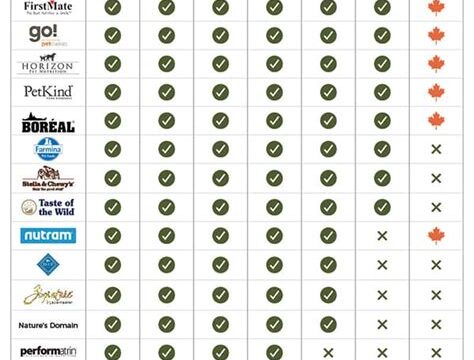Discover the types, cost, and nutritional value of dog food. Explore homemade options, assess ingredients, and make informed decisions for your dog’s health.
Understanding the Types of Dog Food
Dog food comes in various types, each designed to meet different nutritional needs. One of the most common types is dry dog food, which is convenient and has a longer shelf life. Wet dog food, on the other hand, provides more moisture and can be more palatable for some dogs. Then there are semi-moist dog foods, which are usually more expensive and contain high levels of sugar and salt. Understanding the differences between these types can help you make the best choice for your furry friend.
Another important consideration is the diet of your dog. Some dogs may require a specialized diet, such as grain-free or low-calorie options. It’s essential to understand your dog’s specific needs and consult with a veterinarian to determine the best type of food for them. Additionally, there are also prescription dog foods available that are formulated for dogs with specific health conditions, such as kidney disease or food allergies.
Lastly, there are also organic and natural dog food options, which are becoming increasingly popular. These types of dog food typically use high-quality ingredients and are free from artificial additives and preservatives. However, it’s important to note that not all organic or natural dog foods are created equal, so it’s crucial to carefully read the labels and understand the ingredients used.
Analyzing the Cost of Commercial Dog Food
A Comparison of Different Dog Food Costs and Quality Options
When it comes to choosing the right food for your furry friend, there are numerous factors to consider. One of the most important considerations is the cost of commercial dog food. With so many options available on the market, it can be overwhelming to determine which one offers the best value for your money.
It’s essential to compare the prices of different commercial dog food brands and analyze the cost per serving. While some brands may appear to be more affordable upfront, they may actually cost more in the long run if the serving sizes are smaller or have lower nutritional value. By carefully examining the cost per serving, you can ensure that you are getting the best value for your budget.
Additionally, it’s important to consider the quality of ingredients used in commercial dog food. While some brands may be more expensive, they may offer higher quality ingredients that provide better nutrition for your dog. By analyzing the cost and quality of commercial dog food options, you can make an informed decision that benefits both your dog’s health and your wallet.
Comparing Nutritional Value of Dog Food
When it comes to choosing the right dog food for your furry friend, it’s important to consider the nutritional value of the options available. Different dog foods contain various levels of protein, fat, carbohydrates, vitamins, and minerals, and it’s essential to compare these values to ensure your dog’s diet is well-balanced and meets their specific needs.
One way to compare the nutritional value of dog food is to look at the guaranteed analysis on the packaging. This information typically includes the percentages of crude protein, fat, fiber, and moisture in the food. By comparing these values between different brands or types of dog food, you can get a better understanding of the nutritional content and make an informed decision about what to feed your dog.
Additionally, it’s important to consider the specific nutritional needs of your dog based on their age, breed, and activity level. Puppies, for example, require a diet with higher protein and fat content to support their growth and development, while senior dogs may benefit from lower-calorie options with added joint support and vitamins. By comparing the nutritional value of dog food with your dog’s individual needs in mind, you can ensure they are receiving the necessary nutrients for optimal health and well-being.
Exploring Homemade Dog Food Options
Exploring Homemade Dog Food Options
Understanding the Benefits of Homemade Dog Food
Homemade dog food is a popular option for pet owners who want to ensure that their furry friends are getting the best possible nutrition. By preparing their dog’s meals at home, owners have more control over the ingredients that go into their pet’s food. This can be especially important for dogs with allergies or sensitive stomachs. Homemade dog food can also be more cost-effective in the long run, as it eliminates the need for expensive commercial brands.
Choosing the Right Ingredients
When preparing homemade dog food, it’s important to select high-quality ingredients that provide the necessary nutrients for a dog’s health. Lean meats, such as chicken or turkey, are excellent sources of protein, while fruits and vegetables offer essential vitamins and minerals. It’s crucial to consult with a veterinarian or canine nutritionist to ensure that your homemade dog food meets your pet’s specific dietary needs.
Storing and Preparing Homemade Dog Food
Proper storage and preparation of homemade dog food is essential for maintaining its nutritional value and preventing contamination. Cooked meals should be stored in airtight containers in the refrigerator and consumed within a few days. Some pet owners even opt to freeze portions of homemade dog food for later use. When preparing homemade meals, it’s important to follow safe food handling practices to minimize the risk of foodborne illness for both you and your furry friend.
Evaluating the Quality of Ingredients
Evaluating the Quality of Ingredients
When it comes to choosing the right food for your dog, ingredient quality should be one of the top priorities. The quality of the ingredients used in your dog’s food can have a significant impact on their overall health and well-being. It’s important to carefully evaluate the ingredients listed on the packaging and understand what each one brings to the table.
One key aspect to look for in high-quality ingredients is the presence of real, whole foods. This means that the ingredients are not highly processed and retain their natural nutritional value. Whole meats, fruits, and vegetables are indicative of a higher quality dog food, as they provide essential nutrients and are easily digestible for your furry friend.
Additionally, it’s important to be mindful of the absence of artificial additives and fillers in your dog’s food. Ingredients such as artificial flavors, colors, and preservatives are often used to enhance the appearance and taste of the food, but they offer little to no nutritional value and can potentially harm your dog’s health in the long run. Opting for dog food with natural preservatives and minimal additives is a better choice for your pet.
Assessing the Impact on Dog’s Health
Assessing the Impact on Dog’s Health
When it comes to dog food, the impact on your furry friend’s health is of utmost importance. The quality of the ingredients used in their food can have a direct effect on their overall well-being. By carefully assessing the nutritional value and ingredients of the dog food you choose, you can ensure that your dog is receiving the necessary nutrients for a healthy and happy life.
It’s important to look for dog food options that are free from artificial additives, fillers, and by-products. These low-quality ingredients can lead to health issues such as skin allergies, digestion problems, and even obesity. By prioritizing high-quality ingredients and avoiding harmful additives, you can help optimize your dog’s health and well-being.
Additionally, considering your dog’s specific dietary needs and any existing health concerns is crucial. Some dogs may have allergies or sensitivities to certain ingredients, so it’s essential to choose a dog food that addresses these specific needs. By taking the time to assess the impact of your dog’s food on their health, you can make informed decisions that contribute to their overall wellness.
Making Informed Decisions for Your Dog’s Diet
When it comes to making informed decisions for your dog’s diet, it’s important to consider the various options available and the impact they can have on your dog’s health and well-being. Understanding the types of dog food and analyzing the cost of commercial dog food can help you make the best choice for your furry friend.
Exploring homemade dog food options is another way to ensure that your dog is getting the best possible nutrition. By comparing the nutritional value of different types of dog food, you can make an informed decision about what to feed your pet.
It’s also important to assess the quality of ingredients in the dog food you choose, as this can directly impact your dog’s overall health. By evaluating the quality of the ingredients in various dog foods, you can make a more educated decision about what to include in your dog’s diet.
Frequently Asked Questions
What are the factors to consider when comparing dog food costs and quality?
Factors to consider include ingredients, nutritional value, brand reputation, and price per serving.
How can I determine the nutritional value of a dog food?
Check the ingredients for protein, fat, and fiber content, as well as any added vitamins and minerals.
Is it worth paying more for higher quality dog food?
Higher quality dog food often contains better ingredients and may provide better health benefits for your dog in the long run.
What are some affordable yet high-quality dog food options?
Some options include Kirkland Signature, Diamond Naturals, and Taste of the Wild, which offer good quality at a reasonable price.
Are there any specific ingredients I should avoid in dog food?
Avoid dog food with excessive fillers, artificial preservatives, and low-quality meat by-products.
How can I save money on dog food without sacrificing quality?
Look for sales, buy in bulk, and consider homemade dog food using healthy, affordable ingredients.
Should I consult a veterinarian or dog nutritionist when choosing dog food?
It’s always a good idea to consult a professional to ensure that your dog is getting the right nutrients for their specific needs.





